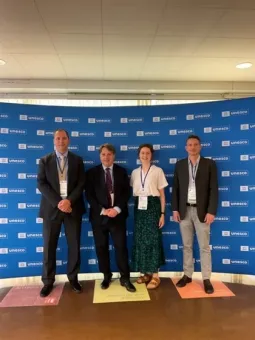
The National Oceanography Centre (NOC) recently provided the UK delegation at the Intergovernmental Oceanographic Commission (IOC) Assembly hosted at the UNESCO headquarters in Paris. Dr Louis Clement and Dr Emma Gregory share their experience.
IOC-UNESCO is the UN body responsible for ocean science, which supports international collaboration and standards. NOC provides the UK Delegation to the IOC, working with national stakeholders, the marine science community, policy makers and marine partners.
The two-week assembly gathered delegations from 150 Member States to set the ocean agenda for the coming two years which is captured in the Assembly Report.
NOC’s Chief Executive Prof. Ed Hill and NOC’s Head of Marine Policy Alan Evans were joined at the event by Dr Emma Gregory and Dr Louis Clement to discuss a wide range of hot ocean topics and fields including:
- Managing the global early warning system for tsunamis and other natural hazards.
- The GOOS programme (Global Ocean Observing System).
- Implementation of the Ocean Decade programme.
- Capacity development for marine science in developing nations.
- ‘Ocean literacy’ and improving public knowledge of marine science and hazards.
- Global marine data management and sharing.

Participating in this Assembly was an excellent opportunity to grasp how international decisions are taken within a UN agency. It was enriching to see the various discussions that can lead to influential decisions. For example, animated discussions were held on how to redistribute the IOC allocations within the different regional sub-committees.
Each Member State can comment and amend the final text through interventions, which involves making a statement to the assembly. Often, the expertise and opinions of scientists is solicited to help write these interventions. An agreement must be found between all the delegations, which can lead to lengthy discussions. Sometimes breakout groups are required to hash out the finer details of the text over lunch or in the evenings, to be then brought back to the full assembly to be approved. Furthermore, elections were conducted to select a new IOC Chair and Executive Council for the next two years, and happily the UK retained its place on the Council.

Highlights included: seeing a wide consensus to improve tsunami warning systems for underwater volcanic eruptions, following the incredible eruption of Hunga Tonga-Hunga Ha’apai volcano last year; meeting such a varied and friendly array of representatives from many backgrounds (science, policy, navy, etc.); the 120th birthday celebration of GEBCO and seeing some of the amazing art inside the UNESCO building, including a huge commissioned Picasso.

As always, things are not all plain sailing, and some key frustrations at the IOC seemed to be a lack of funding to improve activities, and a lack of connectivity with other ocean or science related organisations, which the UK delegation is pushing for. Despite these, and although this kind of policy and decision making can seem slow-paced, it was encouraging to see a huge number of countries so willing to collaborate and compromise to push forward our observation and understanding of the global ocean.
